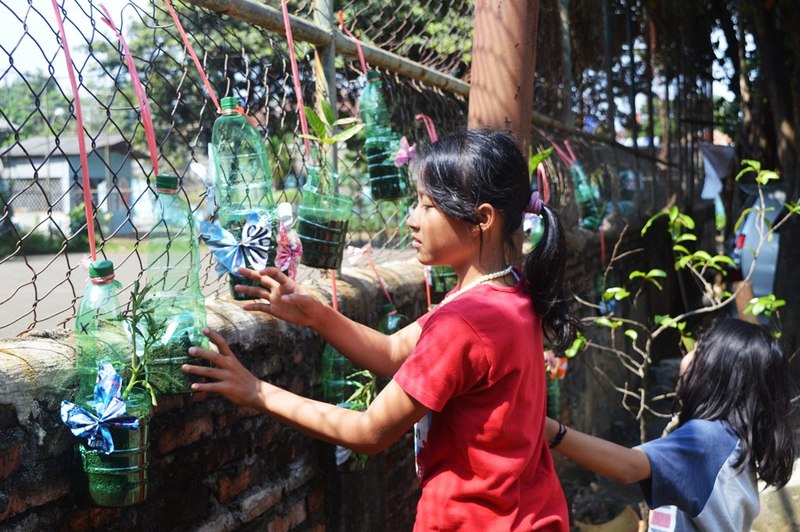
One particular community offers a solution to Jakarta’s waste problem, while supporting the development of street children into independent, educated and skilled young adults.
On a mission to address the environmental, social and economic impacts of plastic pollution and other trash, KDM Green Project was set up by the KDM Foundation to create a green environment through collecting garbage and educating people about waste solutions.
It started in 2000 when a Kampus Diakoneia Modern (KDM) Campus, a school for homeless and marginalised children, had a problem with a large pile of rubbish around the campus produced by hundreds of children themselves. At the time, there was no service to collect the waste from the campus, so it kept piling up, causing lots of flies and most students then suffered scabies. Things had to change. The clean-up began in 2001, and after striving for one year, the garbage was gone.
To maintain it that way, the KDM children suggested that the recyclable waste could be sold to recycling agents. The sorting of rubbish was introduced, and soon after, recyclable waste began to generate income for the children. With the support of KDM alumni students, the KDM Green Project was born in 2002. 

Arnando P. Wibowo (Nando), a KDM alumni who has been running the project since the last two years said that there are still lots of people not understanding and underestimating the waste problem. No matter how big a challenge the community is facing, Nando and fellow friends in KDM Green Project strives to continue the community’s vision and mission as well as the project goals: help Jakarta reduce garbage/waste problem, educate the children at KDM and other people on living sustainably, using recycling waste as an innovative way to generate income for supporting KDM’s education and health programs for Jakarta’s street children and providing local job opportunities.
“In order to keep our programs running, we focus on educating people about waste and we visit schools, companies and even individuals, in addition we provide a reliable collection and recycling service for inorganic waste from the places we can reach, like some housing complex in South, Central and West Jakarta, as well as Bekasi. Now, our works are limited by our facilities, which at the moment is just an old pick-up truck. We’re looking for money, funding or donation to get a new one,” according to Nando.

Nando also admitted that it is getting hard to get money nowadays to run the project. On top of desperately needing a new truck, the waste sales prices continue to decline. Nando said white papers go for around IDR 2,300 per kilogram while magazines or duplex papers are valued at IDR 1,000 per kilogram and glass bottles at IDR 200 per kilogram. At present, workers in the KDM Green Project are paid merely IDR 1,200,000 per month.
The community widely opens its door for everyone who want to join and contribute to the green project through online subscription, SMS or email. After filling in personal details and answering some questions, participants will be educated about waste facts and given tips on waste sorting. The community will arrange the schedule to pick up recyclable waste whether from home, schools, offices, shops and restaurants.

“We have trash lovers, designation for student in the red class or equivalent to senior high school to help us in upcycling waste to be useful and valuable products. They can produce recycled notebook, keychain, pins and eco-brick. On average, we can pick-up three to five tonnes of waste a month. And we cooperate with Ffrash company to recycle glass bottle waste. We prevent all the garbage from being sent to Bantar Gebang landfill,” Nando explains.
Nando admitted that the waste problem is always in their place, because there are always new students who don’t know much about how to manage waste. And it’s become Nando and friends responsibility to educate them before they share to outside campus.

“If there’s an event with outside guests using single-used food boxes, they have to take back their trash. They’re not allowed to produce waste in our campus. Alternatively, we can cook the meals for them, and they can just pay us,” Nando said, laughing.
KDM Foundation
Jalan Rw. Dolar No. 29
Jatiranggon, Kecamatan Jatisampurna
Kota Bekasi, West Java 17432
T: +62 21 844 3545 / +62 812 1913 6417
IG: @kdmgreenproject / @yayasankdm
www.jakartagreenproject.wordpress.com
www.kdm.or.id







